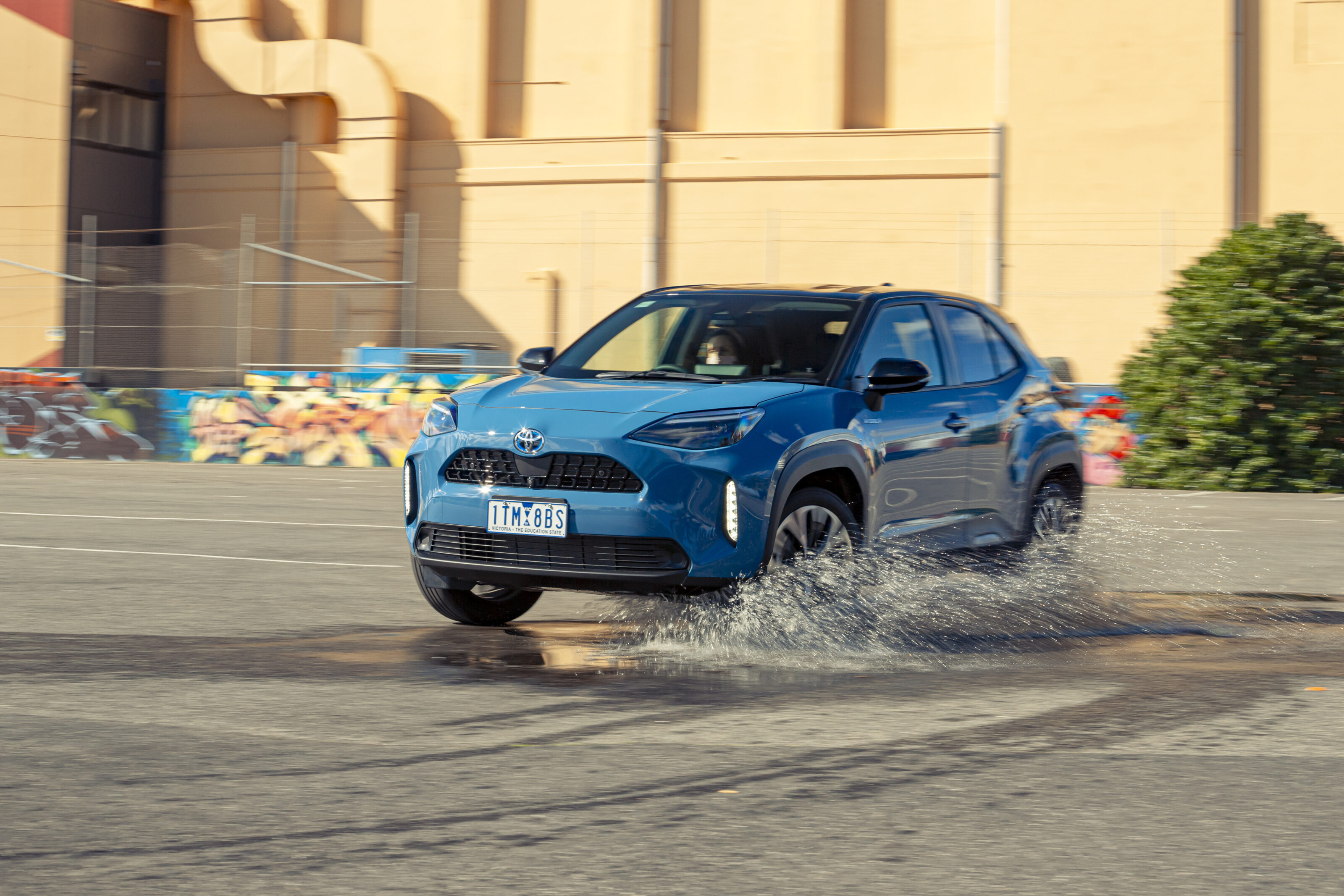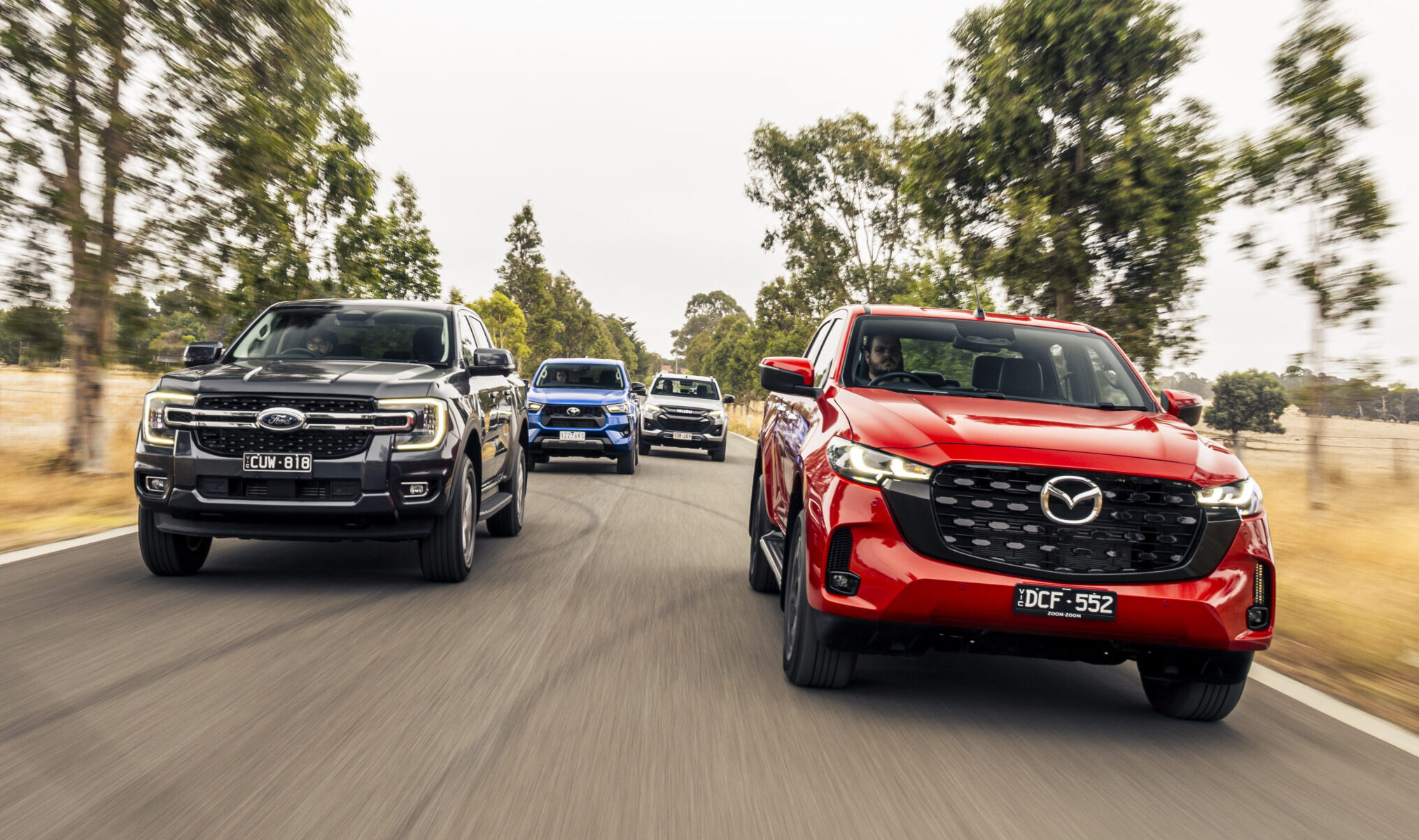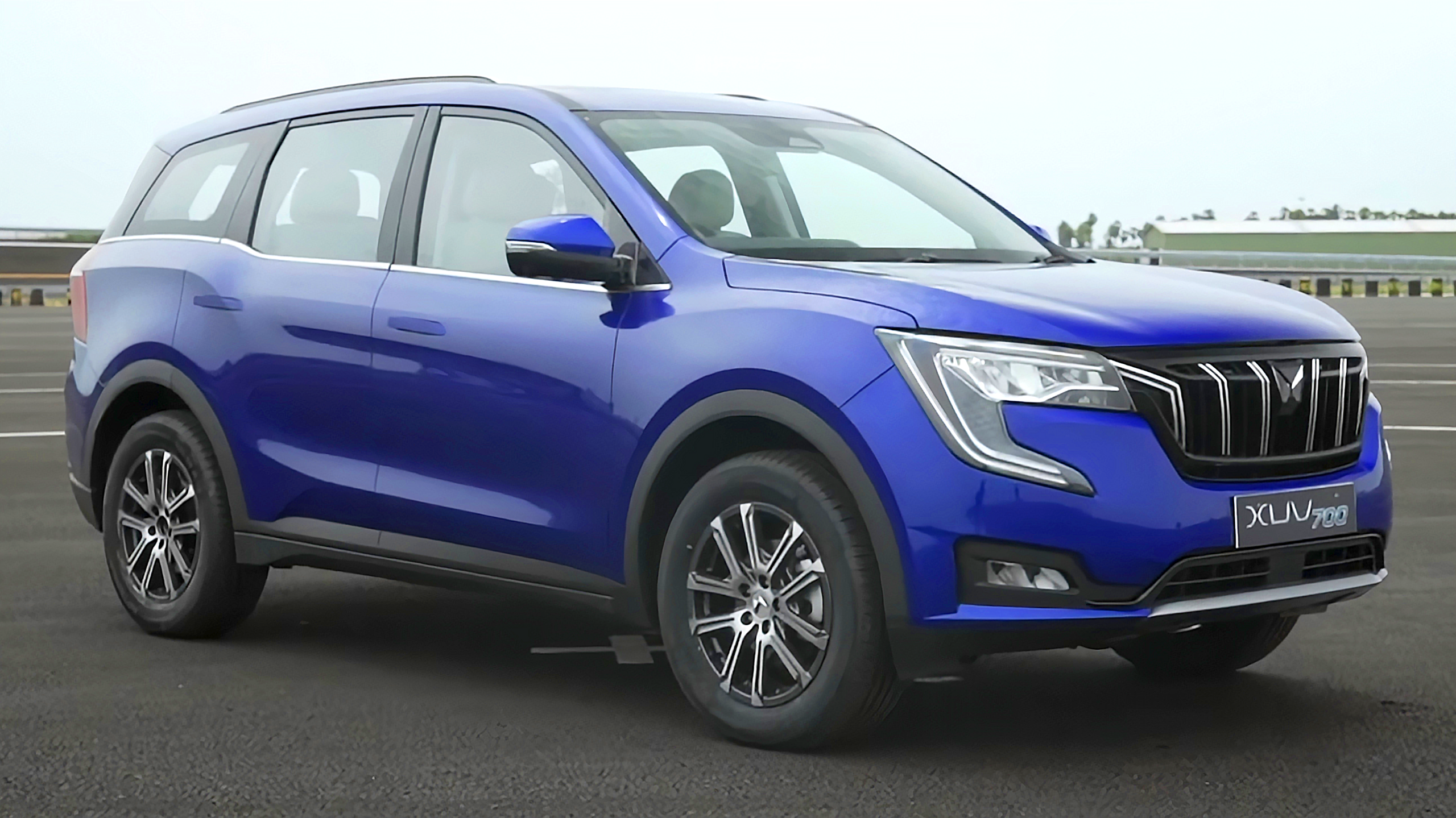Score breakdown
Things we like
- Impressive fuel economy
- High spec as standard
- Hybrid powertrain
Not so much
- Noisy engine and alerts
- Interior finish quality
- High price for top variant
If you think the Toyota Yaris Cross is just going to be a jacked-up ordinary Yaris hatch – think again.
A lot of effort has gone into making this car’s design feel distinct. Whether or not its looks are your cup of tea, that’s a different matter.
The version that has come to live with us for a little while is the 2WD 1.5-litre petrol hybrid in Urban trim, sporting mineral blue paint and a contrasting black roof.
Pricing
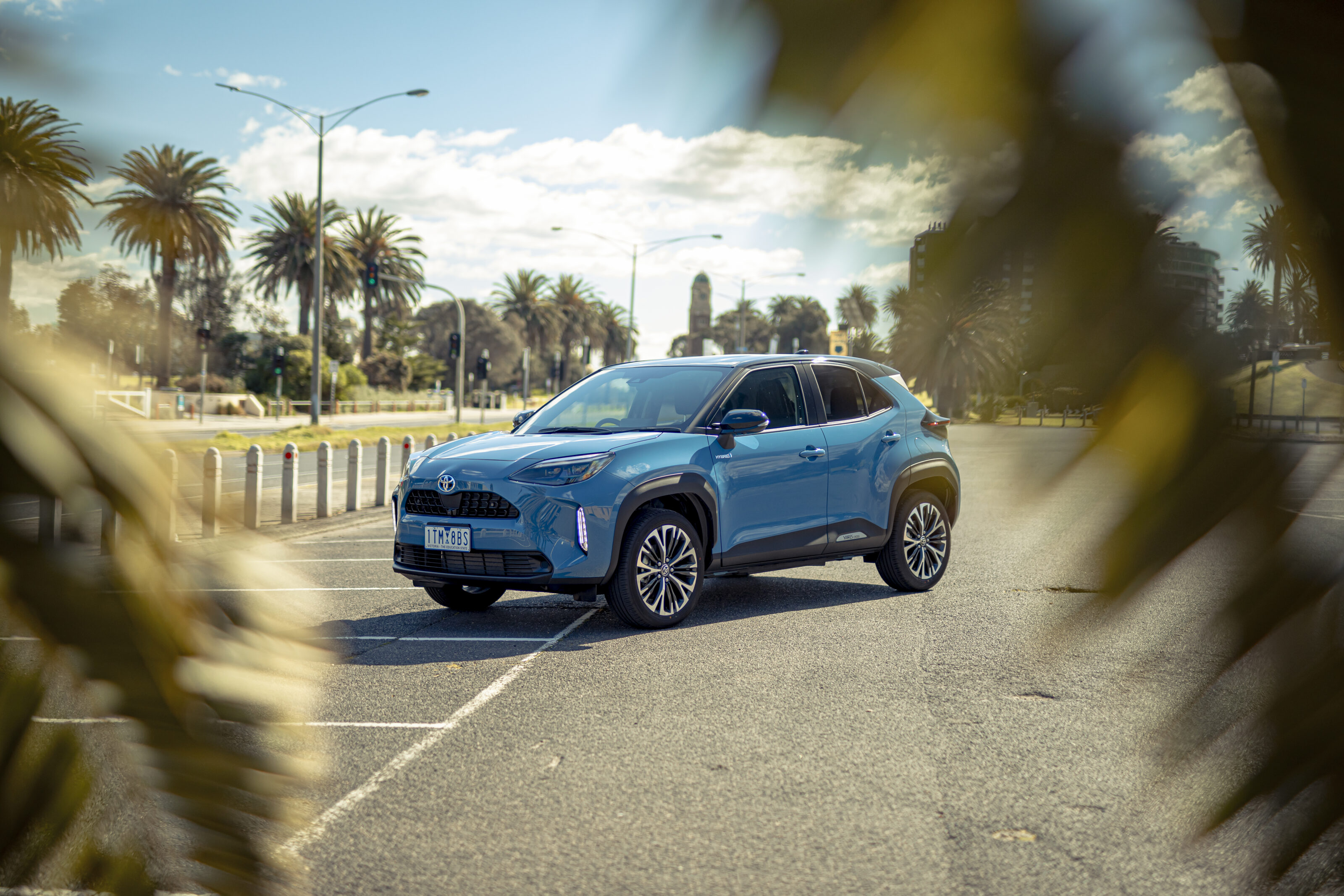
In total there are nine versions of the Yaris Cross, each of the three variants offering a petrol engine or a hybrid with either front- or all-wheel drive, and there are eight metallic, mica-metallic and crystal pearl finishes to choose from. Beyond that, there are no optional extras.
Price wise there’s a pretty big jump between the entry-level GX, mid-range GXL and range-topping Urban. The base spec GX will set you back $26,990 before on-road costs if the standard black paint, two-wheel drive and petrol powertrain are chosen. From there you can only go up.
The Yaris Cross we’ve got on test costs $34,990 before options and on-road costs. But throw in another $500 for the blue paint and an extra $450 on top of that for the two-tone roof, plus a load of taxes and other charges, and the Victorian drive-away price quoted by Toyota quite quickly breaks the $40K mark – coming in at $40,758.
Features
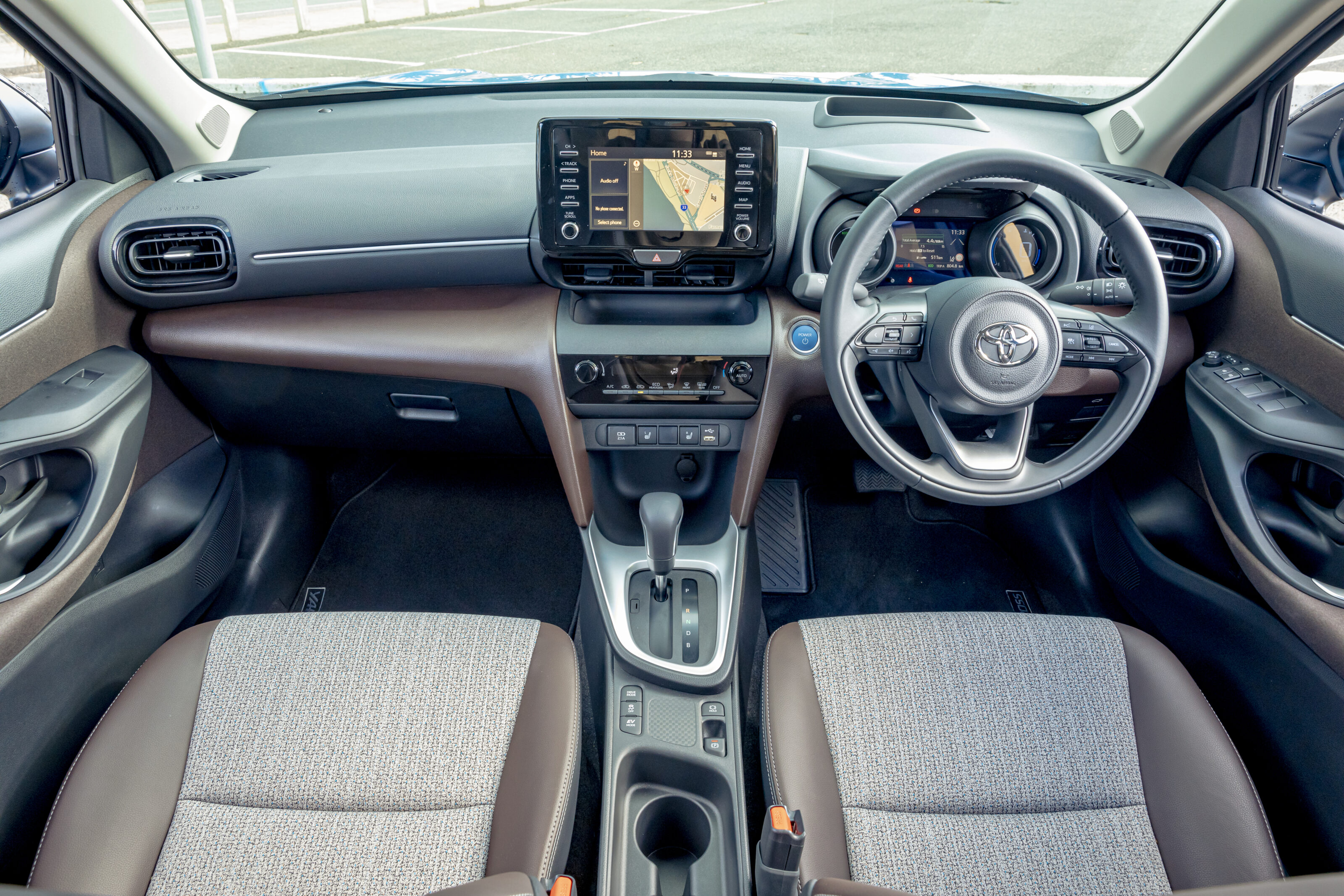
This is the city car that has grown up and bears little resemblance to its counterpart.
Instead, it has edgier lines, it’s taller (20mm more ground clearance than the hatch for 170mm overall) and it has a chunky, solid presence making it feel like the teenager who is out to prove themself among their peers.
In profile, the exterior now features plastic wheel arches as standard (we don’t love that you can’t get a body-coloured option), while at the front there’s a flatter bonnet and it loses the hatch’s split grille in favour of a wider, longer lower air intake.
The Yaris Cross we’ve got on test costs $34,990. But throw in options plus a load of taxes and other charges, and the Victorian drive-away price quickly breaks the $40K mark – coming it at $40,758.
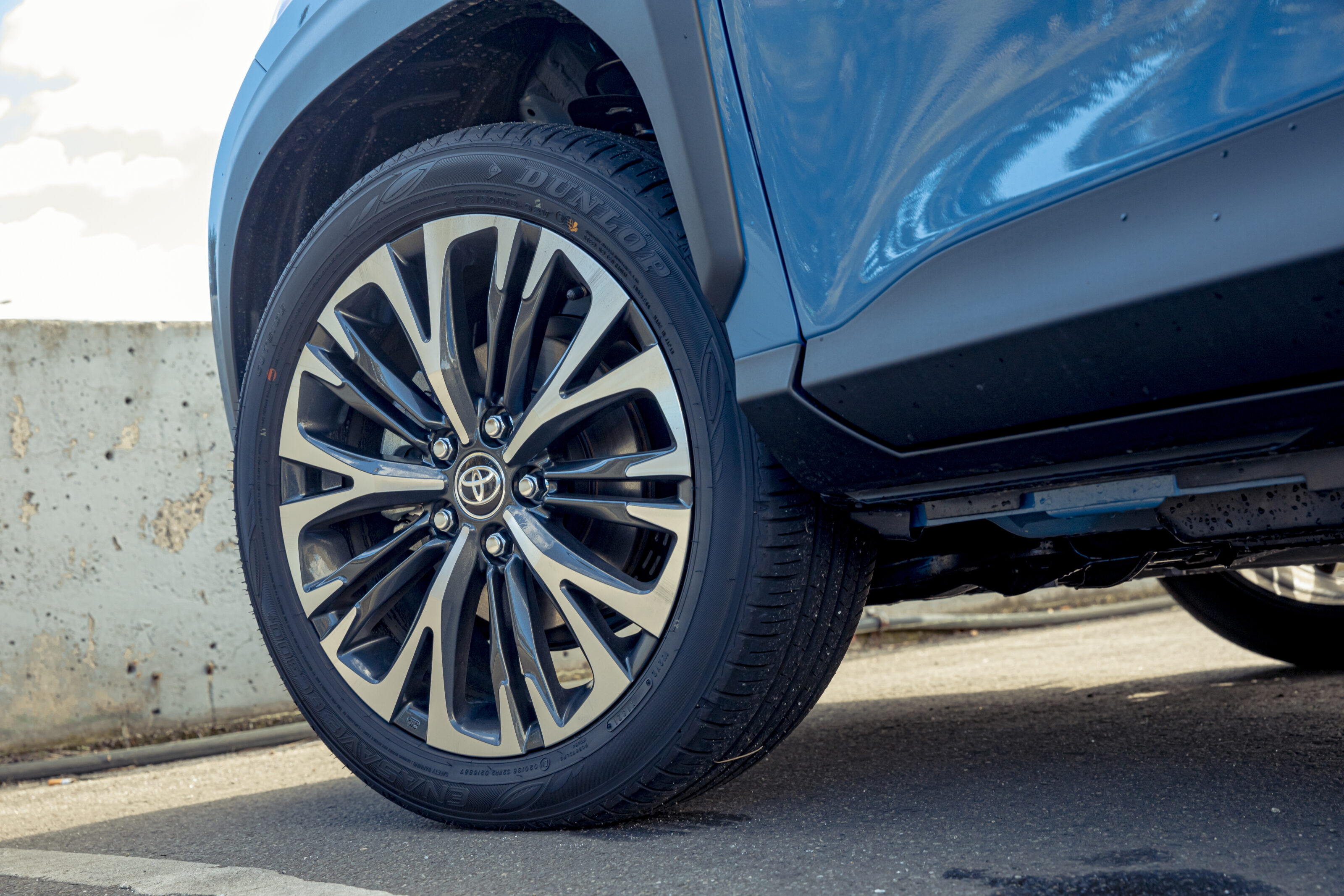
Those at the sides have also been replaced by LED daytime running lights, which are standard only on the GXL and Urban. The headlights themselves are wider and rounder, which makes the Yaris Cross appear more imposing.
While the Urban rides on 18-inch wheels wrapped in eco tyres, the GX and GXL step down to 16s all round. Interestingly though, there’s no difference in as-tested fuel economy figures despite the smaller wheel size.
At the rear, the aesthetics are more similar to the Yaris hatch than anywhere else on the car, with the creases and black panel running along the tailgate retained. But that’s pretty much where the parallels end.
Measurement-wise, it’s 4180mm in length, with a width of 1765mm and height of 1590mm – making it 240mm longer, 70mm wider and 85mm taller than the Yaris hatch.
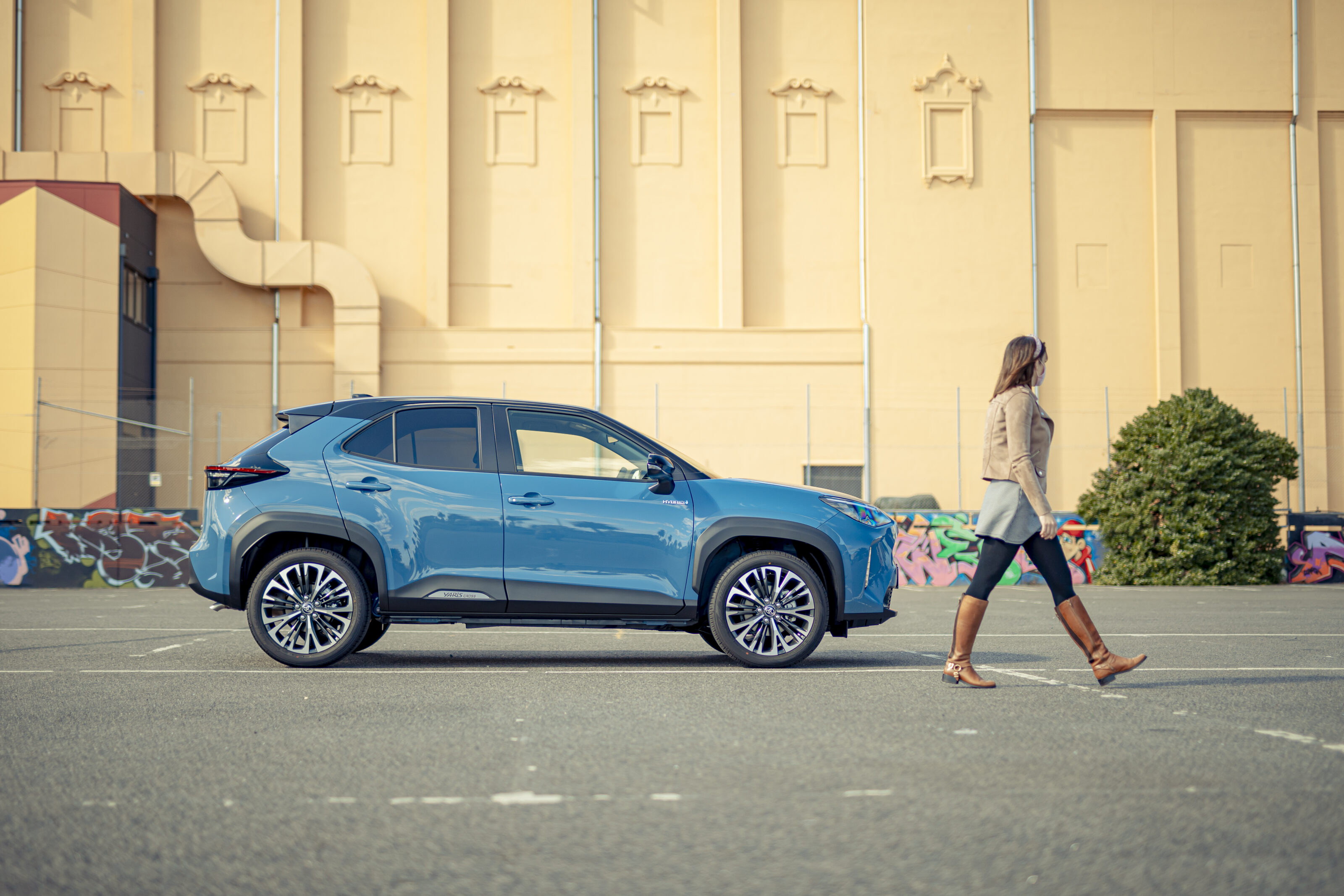
Inside, the appearance is also a little divisive. There’s a lot of plastic on offer and family members’ thoughts on the look and feel of the fabric differ.
This Urban variant features a tweed-like fabric with dark brown artificial leather accents for the upholstery – which we think wouldn’t look out of place on an English farmer’s flat cap. However, the GXL and GX make do with a more restrained grey fabric.
There’s something about the old-fashioned look of the interior clashing with the jazzy, young and fresh-looking exterior that just doesn’t quite sit right or make sense for us.
Nifty features include heated front seats, electrically adjustable driver’s seat (both of these things are available in Urban guise only) and USB ports for charging.
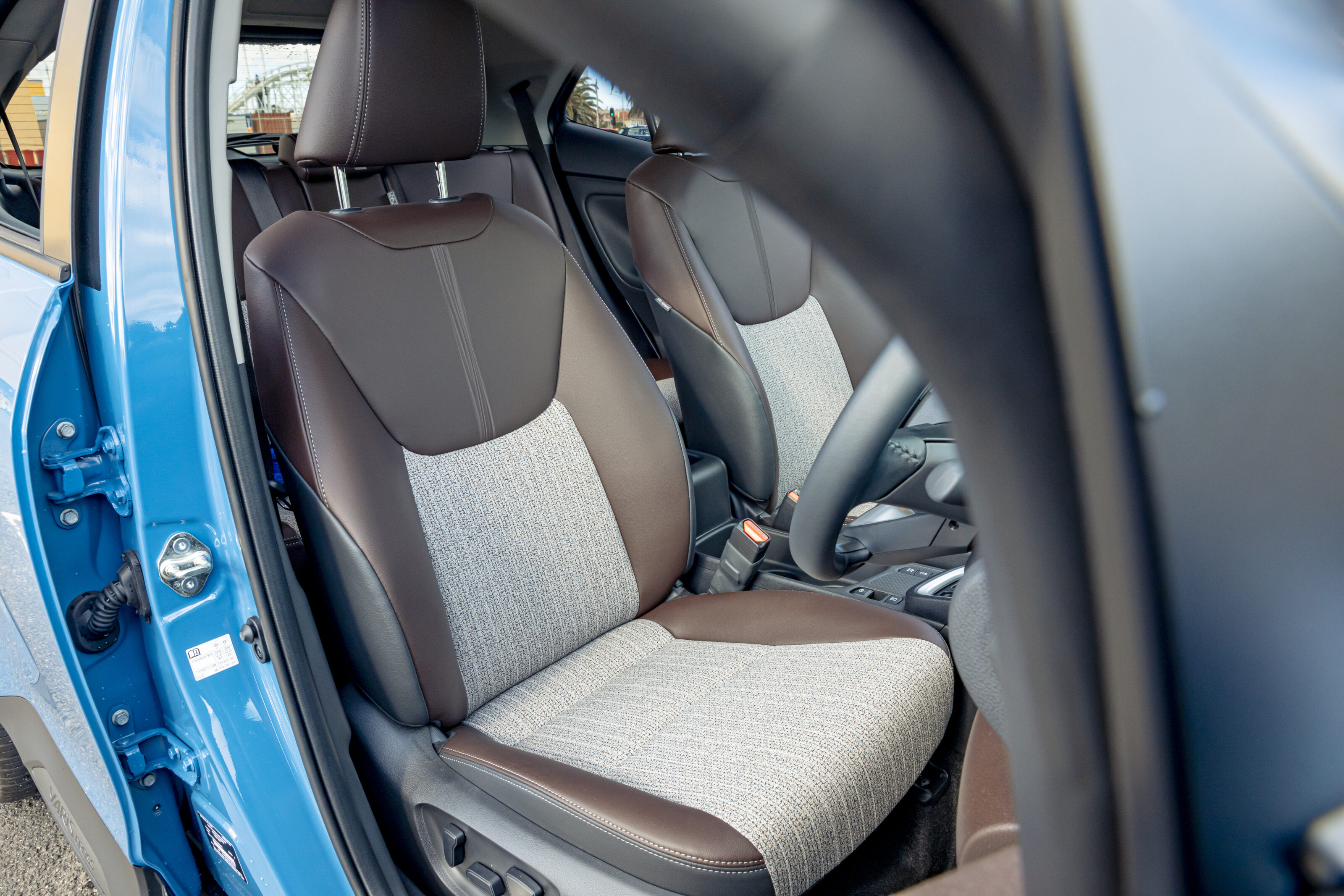
The 7.0-inch touchscreen is relatively simple and easy to use, and comes with Apple CarPlay and Android Auto integration – although the resolution leaves a lot to be desired, especially when using the on-screen parking functions.
We also like the 4.2-inch digital binnacle display that provides straightforward information on the performance and status of the hybrid system. The GXL and Urban also include sat-nav as standard.
Although it appears easy enough to use on the face of it, we’d still always prefer to use other map systems through our smartphones instead, as they tend to be more accurate.

Also useful on the Urban variant is the powered tailgate with a kick sensor for hands-free opening when carrying shopping or other items (your small children for example) and a head-up display – although worth noting that when the sun is particularly strong it can be hard to make out.
Considering that this particular version costs in excess of $40k, and that’s without adding AWD, there are some finishing touches we’d expect to be better for the money.
For instance, there’s no centre armrest, no vanity mirror on the passenger’s side and the traditional parcel shelf has been replaced by a flimsy mesh construction.
In the back too, there’s a distinct lack of amenities. Disappointingly, there are no air vents in the second row, nor are there USB ports or grab handles. For a two-year-old in a car seat, it works just fine though, thanks to the ISOFIX anchors.
Comfort and Space
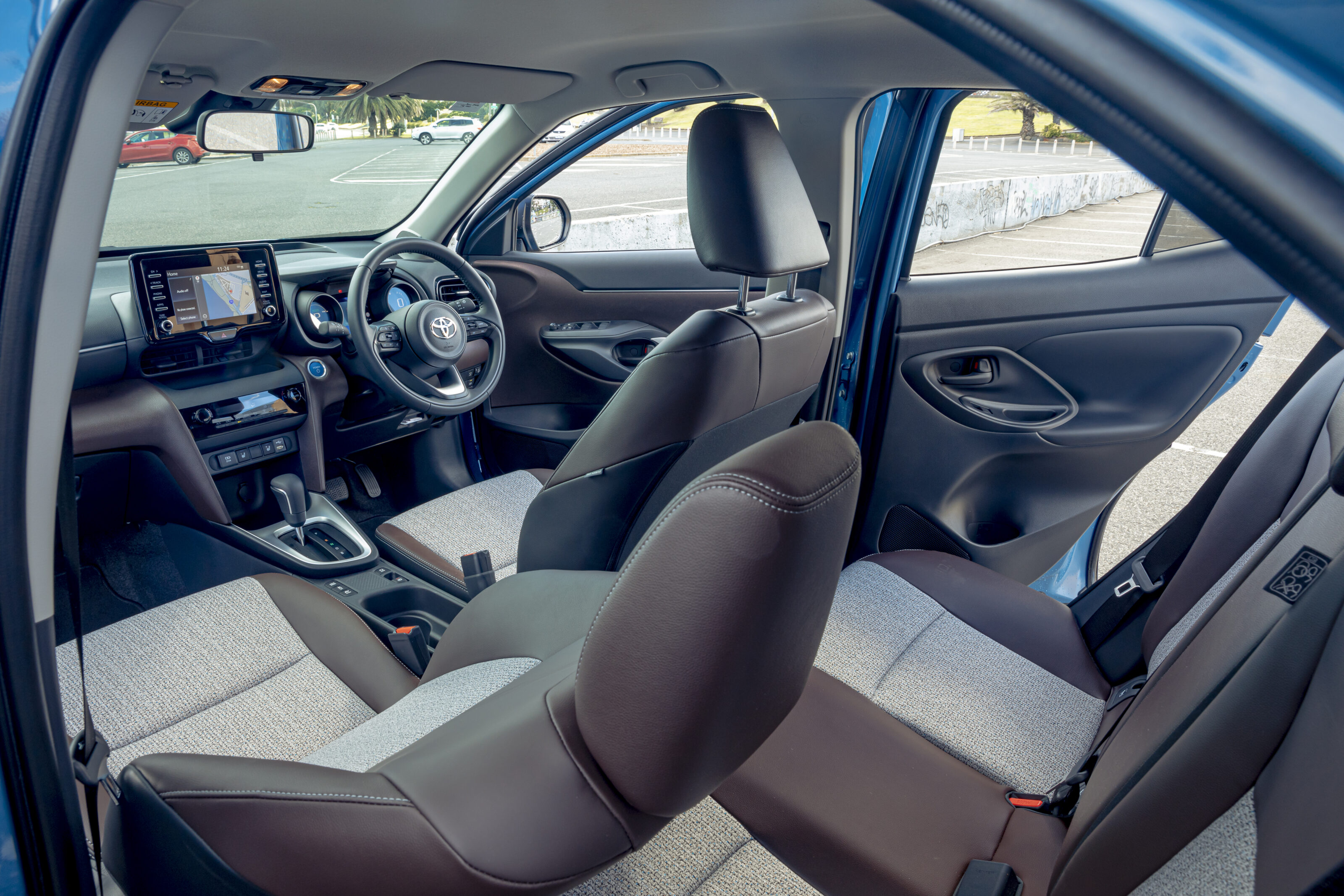
On first examination, there doesn’t appear to be a lot of space – even if Toyota does call it “airy”.
Compared to its new-kid-on-the-block rival the Ford Puma, it is short on places to put things, and while it can easily manage a trip to the shops or a day out with a pram, putting it to the test for a weekend getaway with more bags, a buggy, travel cot and any other baby/toddler associated kit, it would most likely struggle.
Getting the little ones in and out of the back doors can also be a bit tricky, as they don’t open very wide – a must-have for many with young families.
Fitting in more luggage can be achieved by utilising the 40/20/40-split rear seat with each individual section able to be folded flat. The boot itself also has a 60/40-split boot floor on 2WD variants, which makes storage slightly more versatile (on paper at least, we couldn’t quite figure out what the point of this was).
In the lower position, the Yaris Cross’s max cargo capacity is 390L in the 2WD or 314L in the higher level or in the AWD.
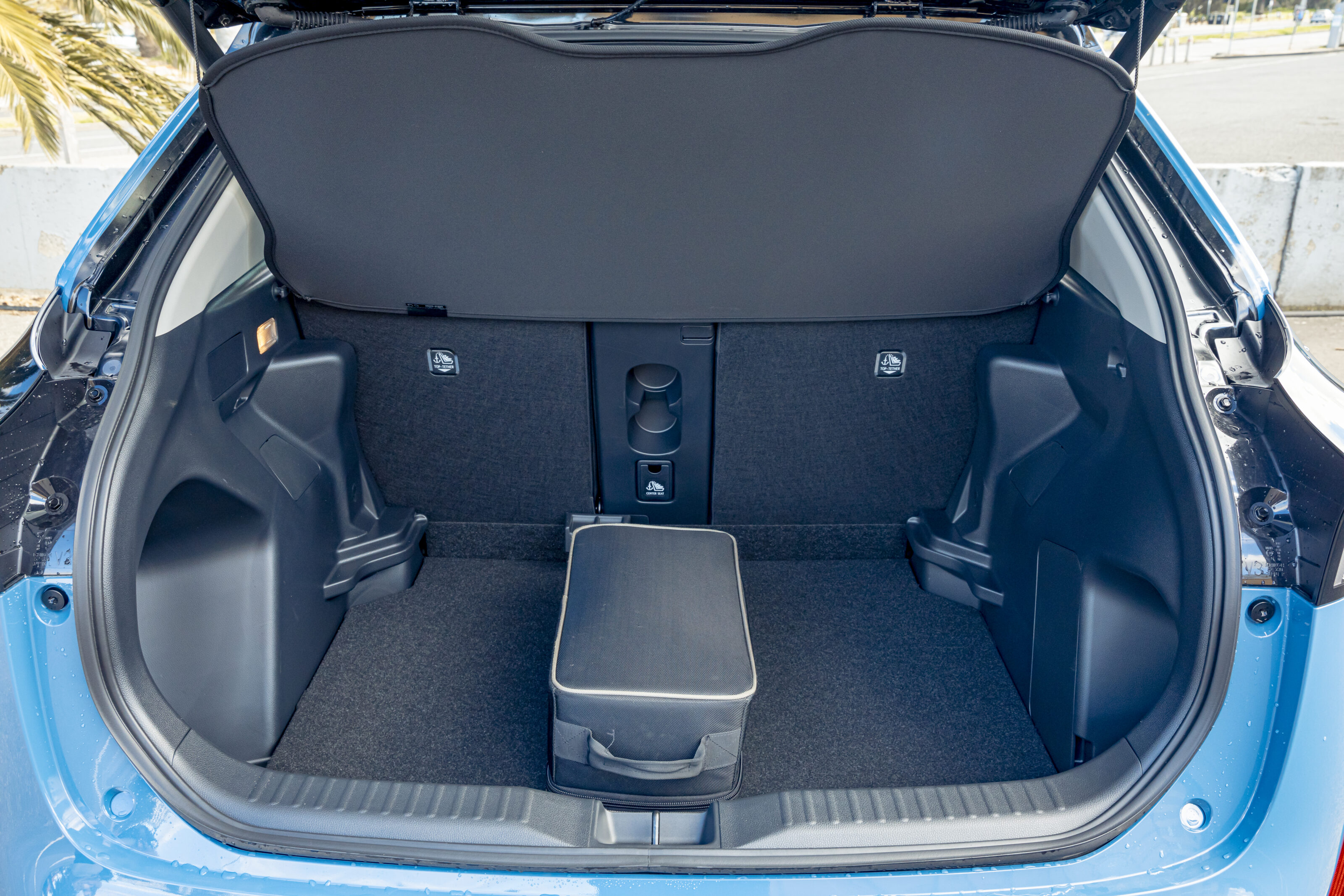
As it’s spent most of its life with us in some sort of lockdown though, this Yaris Cross has sadly not had a chance to prove it can shine in long-distance driving and the furthest it has been was on a blast out of Melbourne and down to Victoria’s Mornington Peninsula.
Unfortunately, on longer drives such as this, the front passenger’s space feels a touch confined, and though the back seat offers moderate legroom, space for three people or two with the centre armrest down (lucky them!) – it could be a squeeze for taller folk.
Our two-year-old’s feet were pushing up against the back of the front passenger seat even with it fairly far forward.
Seats all round feel suitably comfy, though only the driver’s is electrically adjustable as mentioned.
On the Road
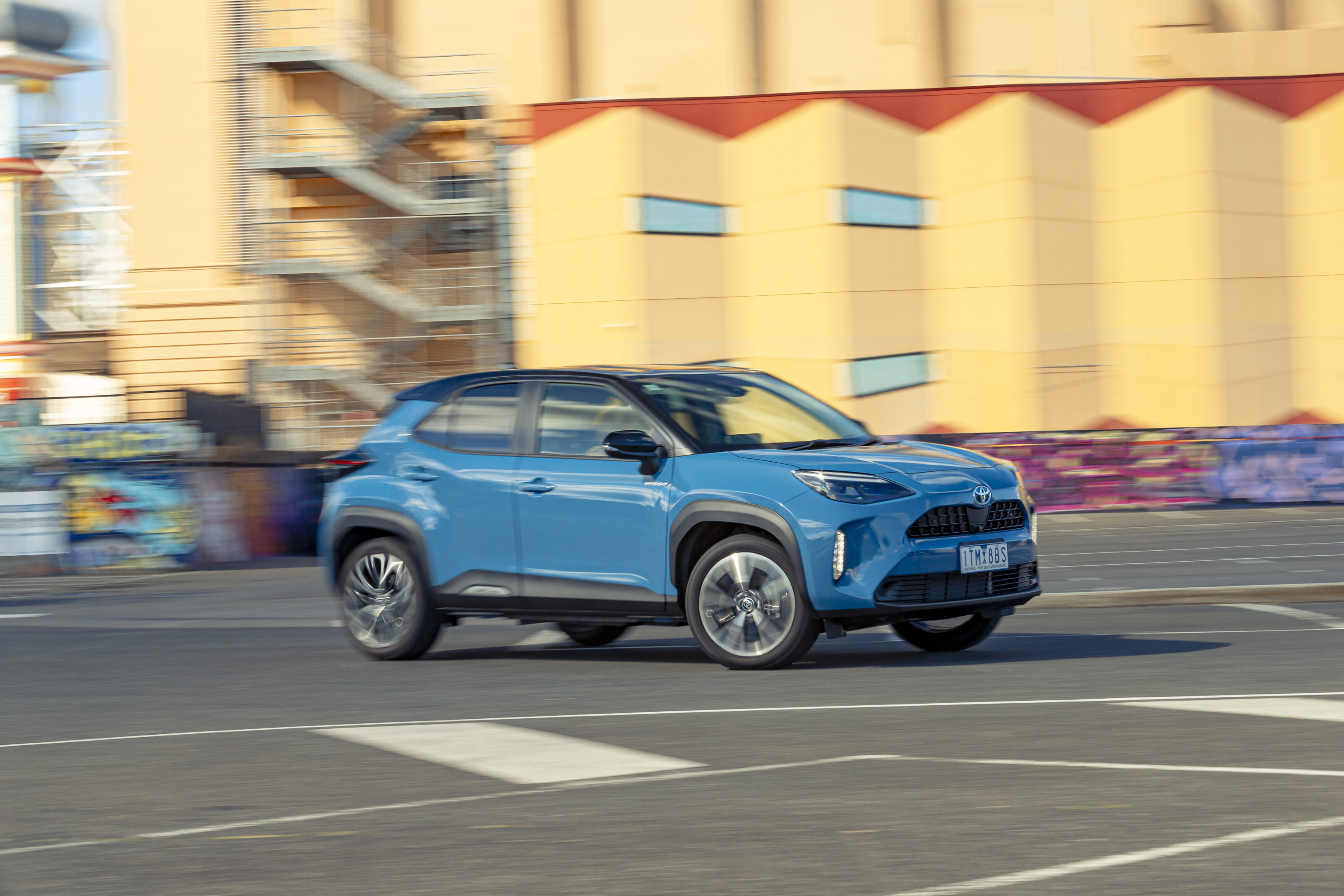
How do you know it’s still that same Yaris underneath? It’s got the hatch’s 1.5-litre 3-cylinder petrol mated to a continuously variable transmission (CVT), sending 67kW/120Nm to the front wheels – which is upped to 85kW of power when combined with two electric motors in hybrid guise.
The non-hybrid petrol version has slightly higher power and torque outputs of 88kW/145Nm. Choosing the AWD powertrain gains a third motor to drive the rear wheels.
Now this car is truly one of two halves. Serenely quiet and smooth pulling away from the lights in EV mode, the three-cylinder is quite loud when it gets into its stride and there’s no perceptible gear change to break up the monotony owing to the CVT. Having said that, at freeway cruising speed, overall wind and tyre noise is very respectable for a car of its size.
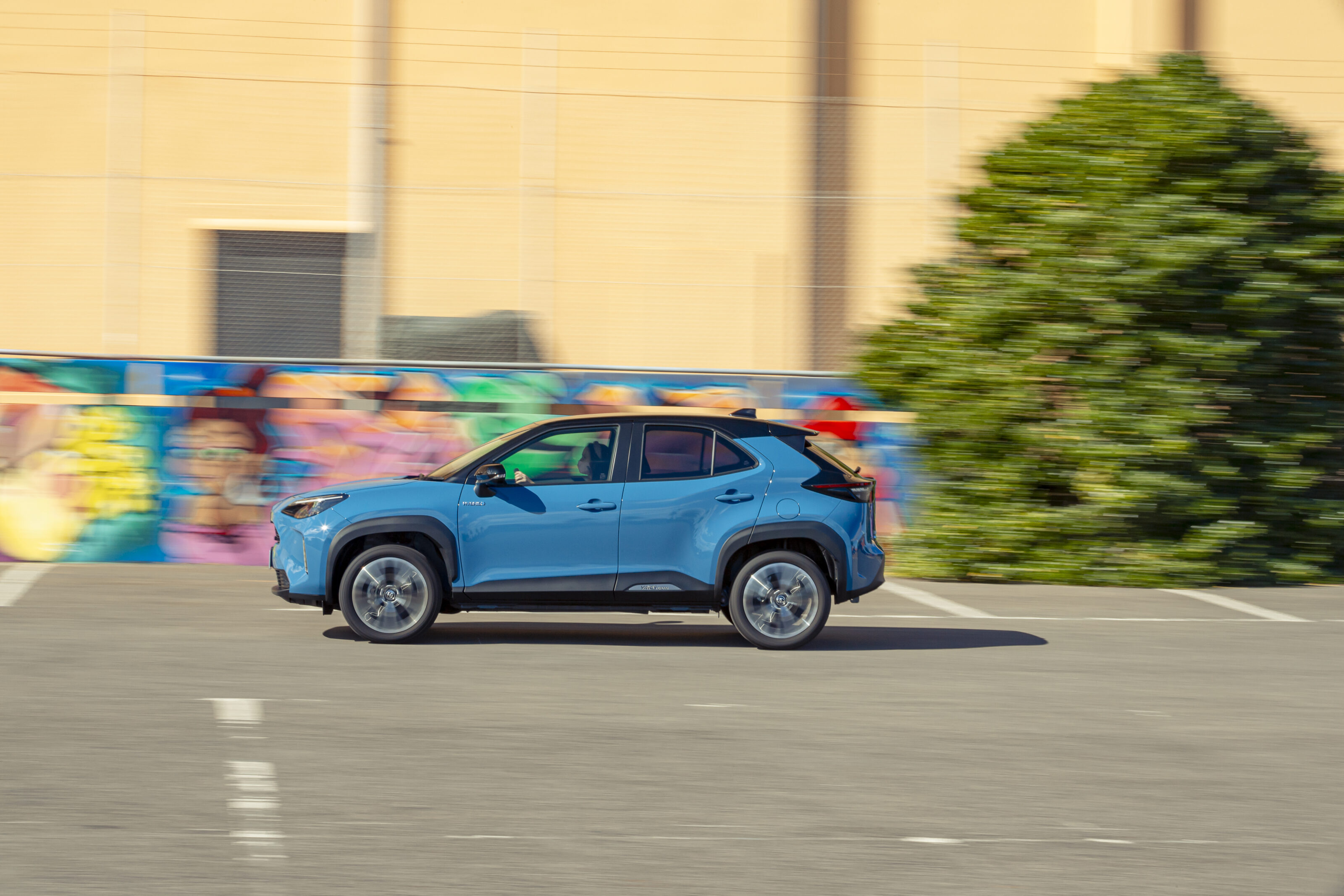
While its low-end response is quite strong for a small unit, put pedal to the metal on the freeway and unsurprisingly, with just 67kW/120Nm to play with, it’s going nowhere fast. At higher speeds the din evens out, making long stints on the Monash that little bit more bearable.
There are three driving modes: EV, Auto and Power – but to be honest we haven’t found all that much difference between the latter two, with no obvious boost in performance.
Around town, where undoubtedly the Yaris Cross will spend most of its time, it’s a solid performer with quick and responsive steering aided by an electrically assisted rack-and-pinion set up – as well as a small steering wheel with decent grip. Cornering and changes in direction are undertaken with ease, no doubt helped by its size.
Ride is smooth and comfortable and it handles itself well over minor bumps on suburban or regional main roads.
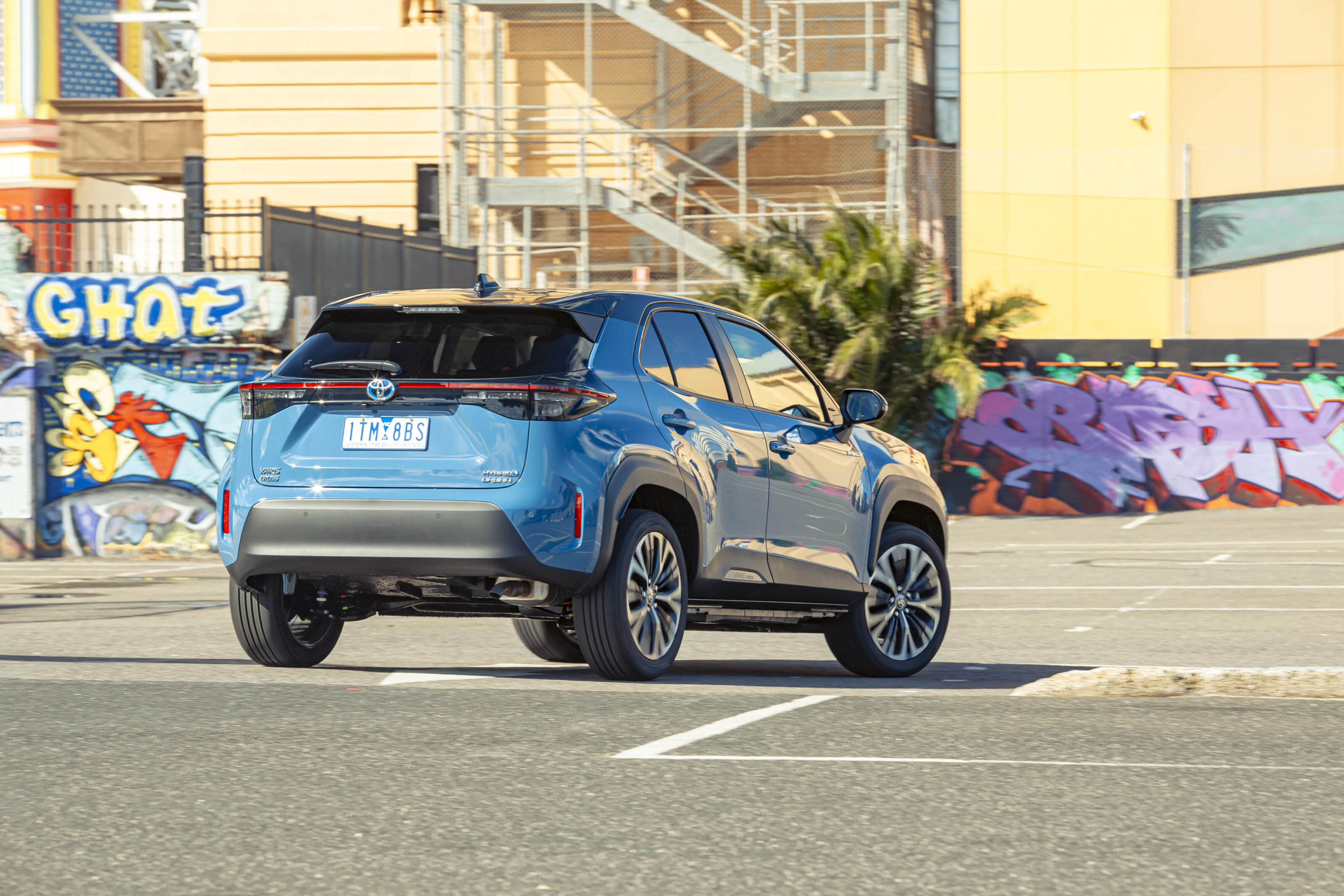
The most interesting thing about the Yaris Cross though is its hybrid system, a big factor for many forward-thinking Aussies and why Toyota’s line-up continues to be so successful month after month.
This is the first ‘self-charging’ hybrid yours truly has had the chance to drive, and we’ve found the electric power to work in two ways.
The first happens under roughly 40km/h or when driving consistently at a higher speed, let’s say in this case 80km/h – you can drive purely on electric with a little green car appearing on the display to let you know you’re not using any fuel. However, with barely a nudge of the accelerator you’re flipped back into using petrol. When you brake, it charges.
The second is to press a little button in the centre console which pops it into EV mode. It differs from the other modes by letting you use purely electric power to travel without the petrol engine cutting in up to a maximum of 47km/h, which makes it ideal for zipping around town.
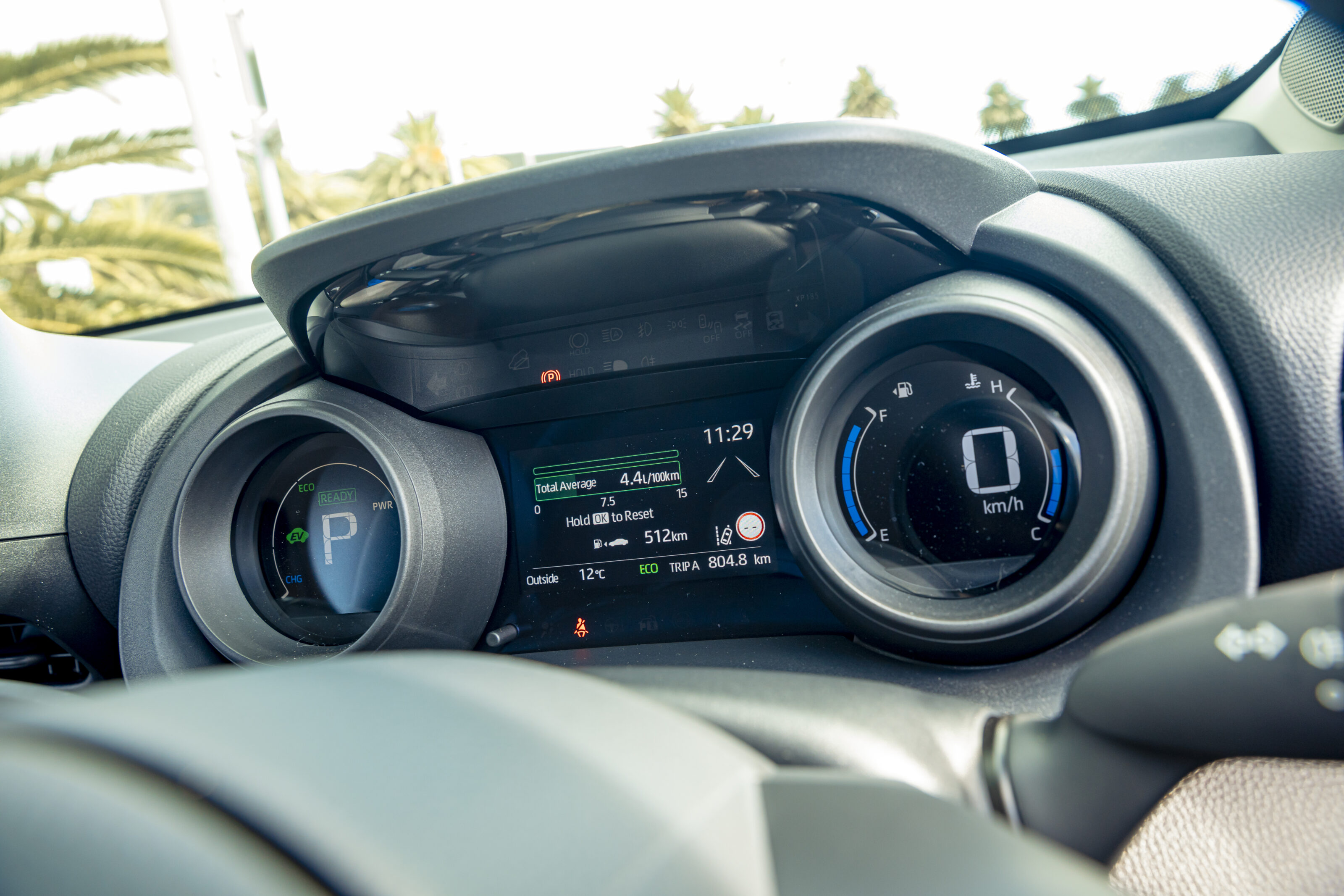
But bearing in mind most of our driving with the Yaris Cross has been during lockdowns, the majority of the time the car has been used for only short trips. Mostly this has involved doing the twice daily kindy run – which hasn’t been enough to charge the hybrid battery to power a single 2km trip on electricity alone.
As a result, just like with any other car powered by a traditional internal combustion engine, fuel economy isn’t as good as it could be. Officially rated at 3.8L/100km, we’ve found the best we could achieve was 4.0L/100km. That’s impressively close for real-world driving, but with COVID-19 restricting our ability to travel, most of the time it has been closer to 5.0L/100km.
Still, a pretty impressive effort, and its official CO2 emissions of 86g/km are enviable compared to its CX-3 and Puma rivals that state 143g/km and 121g/km respectively. Neither are, however, offered with a hybrid drivetrain.
Safety

The Yaris Cross comes with the Toyota Safety Sense package which includes:
| Eight airbags |
| Pre-Collision Safety (PCS) system with day/night pedestrian and day cyclist detection |
| Emergency steering assist |
| Lane trace assist |
| Lane departure alert |
| Steering assist |
| Daytime intersection turn assist |
| Auto high beam |
| Road sign assist |
| Adaptive cruise control |
The mid-range GXL and range-topping Urban grades gain front and rear parking sensors, blind-spot monitoring and rear cross-traffic alert, a panoramic view monitor and parking support brake.
All trims benefit from a reversing camera with back guide monitor.
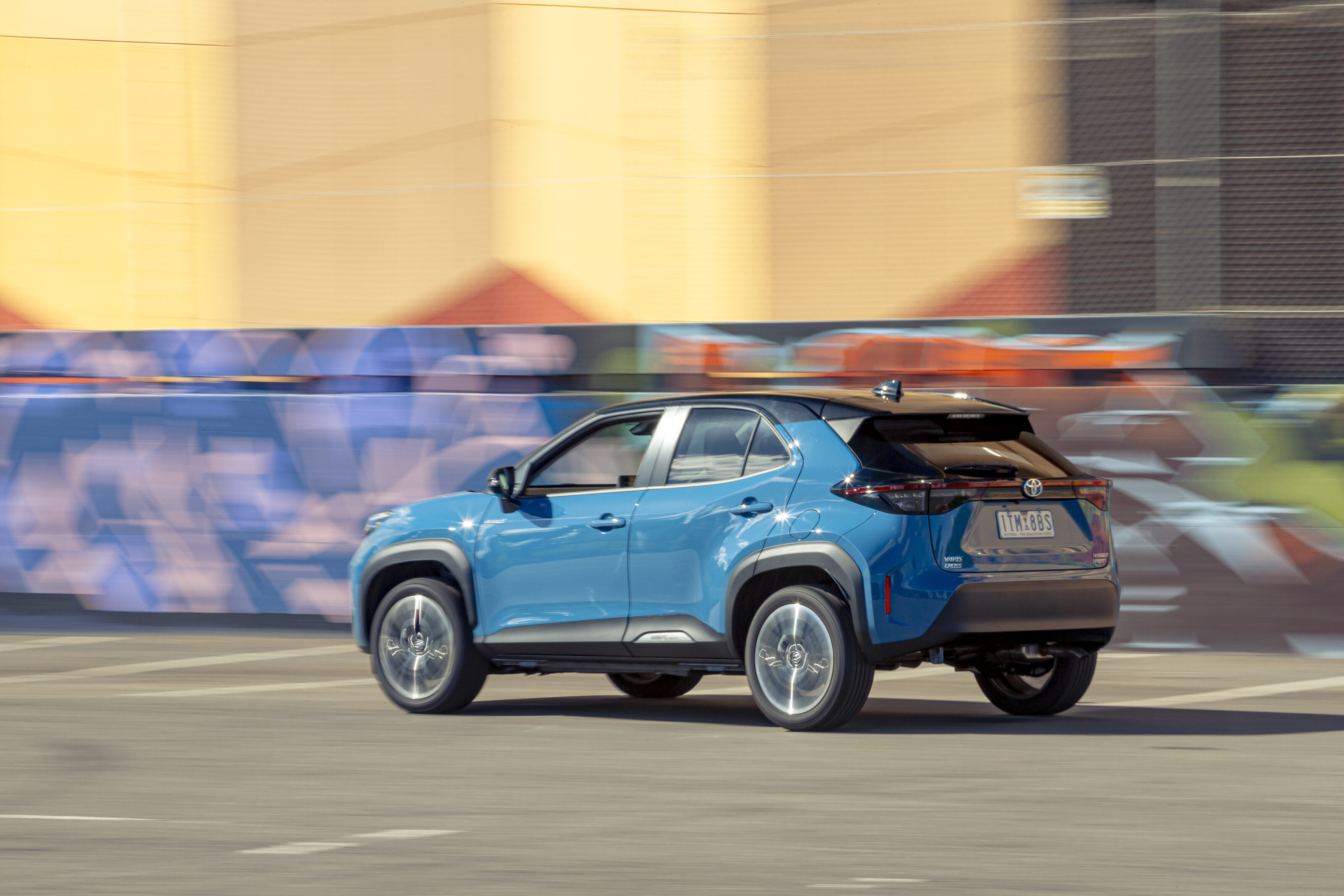
The safety systems have proven themselves useful, especially the lane departure assists – if a little loud and overzealous. While driving down a normal suburban street it panicked at us passing a parked car with a loud noise and BRAKE! warning coming on, even though the only car was on the other side of the road.
If there’s one thing about this car that irks somewhat, it’s all the beeps and noises. There are so many it’s hard to know what to take seriously – like the boy who cried wolf. Undoubtedly some of these can probably be turned off, but should you?
The Yaris Cross has a five-star ANCAP rating awarded in September 2021.
Ownership
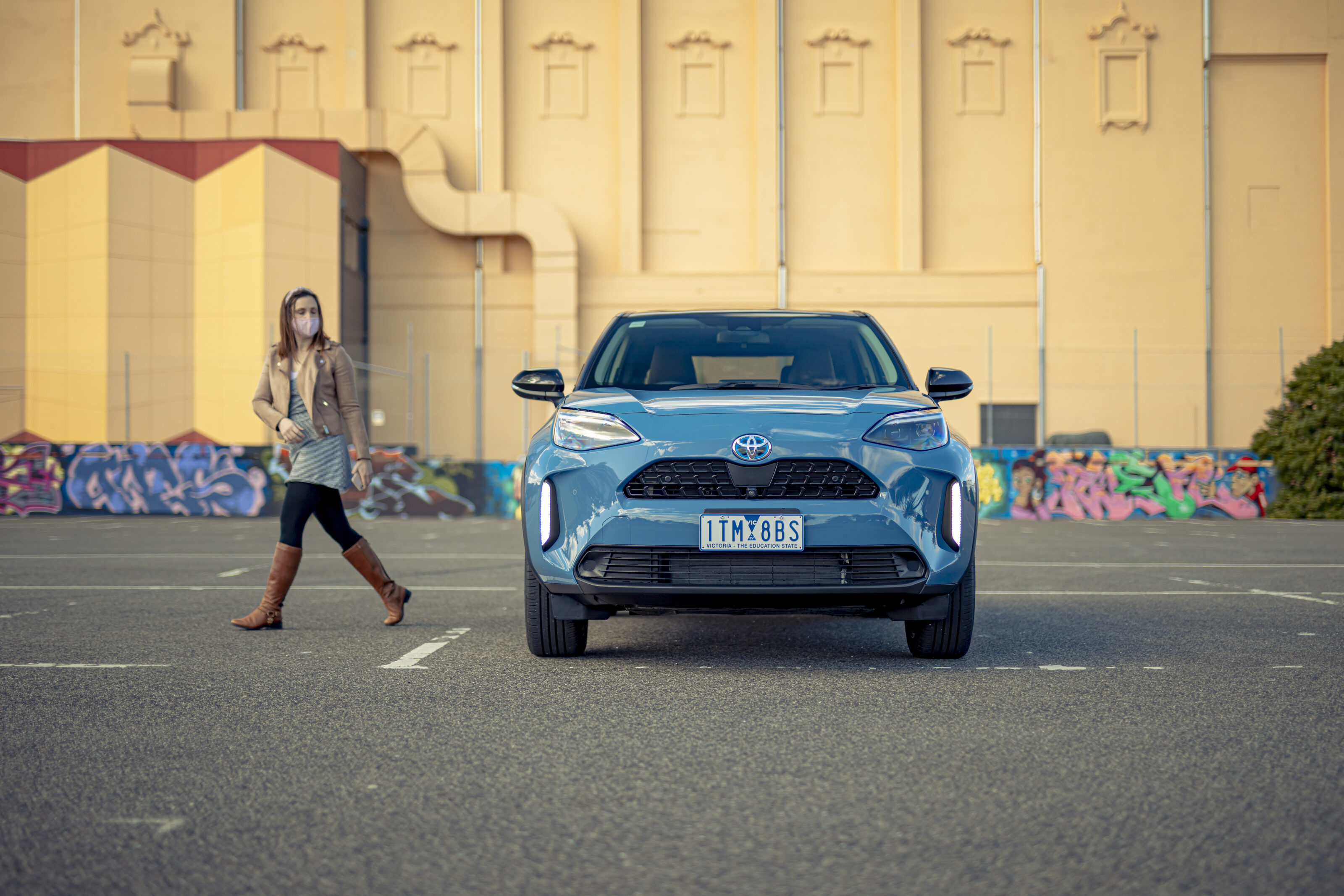
Toyota’s first foray into the light SUV segment, the Yaris Cross is performing well already – having sold 4686 since launching in late 2020.
In July this year alone 472 were snapped up, making it the second best-selling model in the class (behind the popular Mazda CX-3) both for that month and year-to-date, despite having some more established competitors such as the Nissan Juke and Volkswagen T-Cross. In comparison, another new rival, the Ford Puma, had just 203/2192 sales for the same respective periods.
All Toyotas come with a five-year/unlimited-kilometre warranty, plus seven years for the engine and 10 for hybrid batteries, with capped-price servicing for the first five intervals of six months/10,000km (whichever comes first) costing $205 each.
Verdict
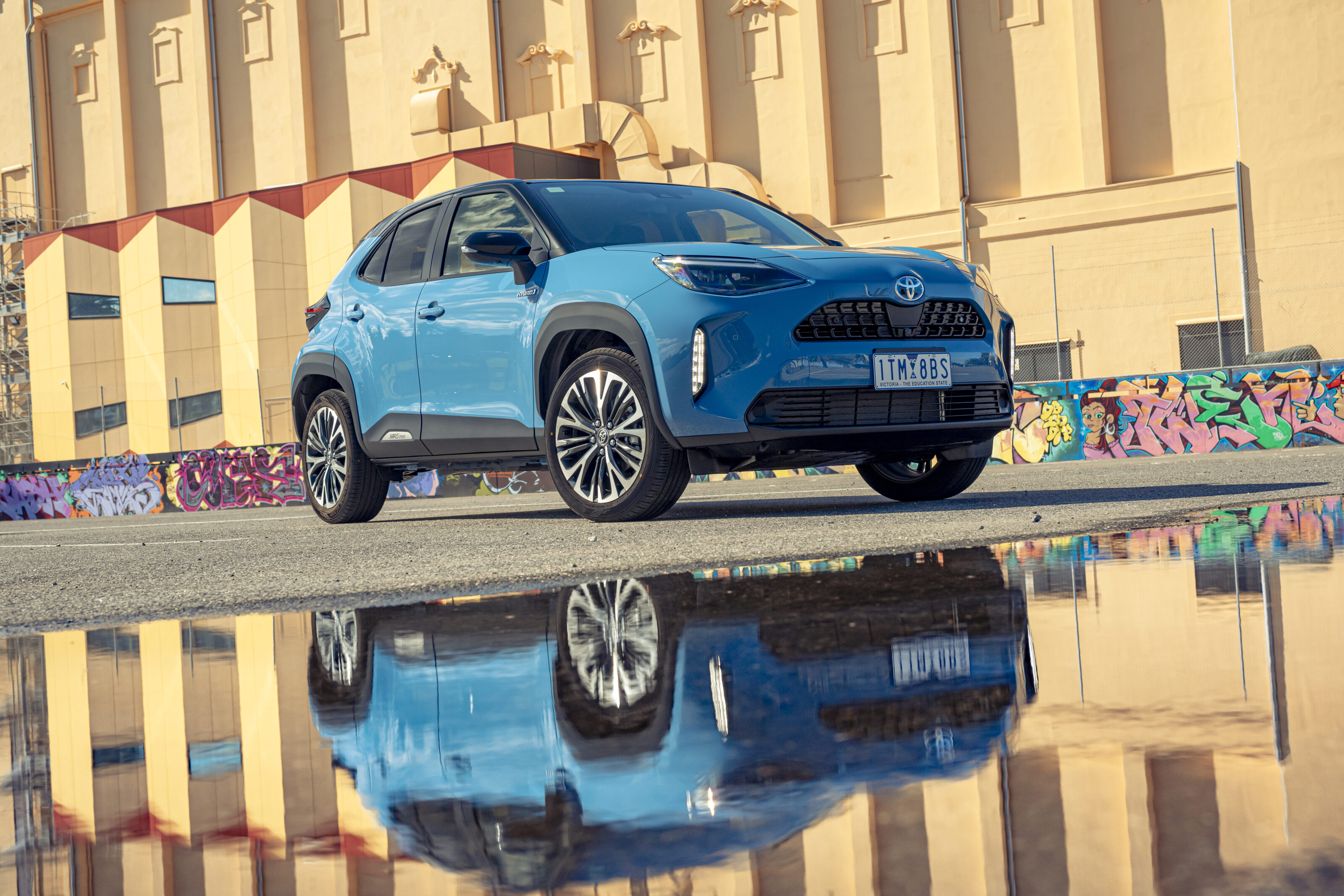
Toyota pitches the Yaris Cross as meeting the “lifestyle needs of active urban dwellers” and we’d say that sums it up fairly well. As an about-town daily driver, it is more than capable of ferrying around your littlest family members with a modest amount of accompanying kit, or would easily fit the bill as an efficient commuter car.
Out of the three, GX, GXL and Urban variants though we’d go with the mid-range GXL 2WD hybrid option.
While it loses the finer touches of the head-up display, heated seats and blind-spot monitor/rear cross-traffic alert safety features, it comes in at a more palatable $36,643 drive-away and still keeps the LED headlights and an onboard satnav above the entry-level GX.
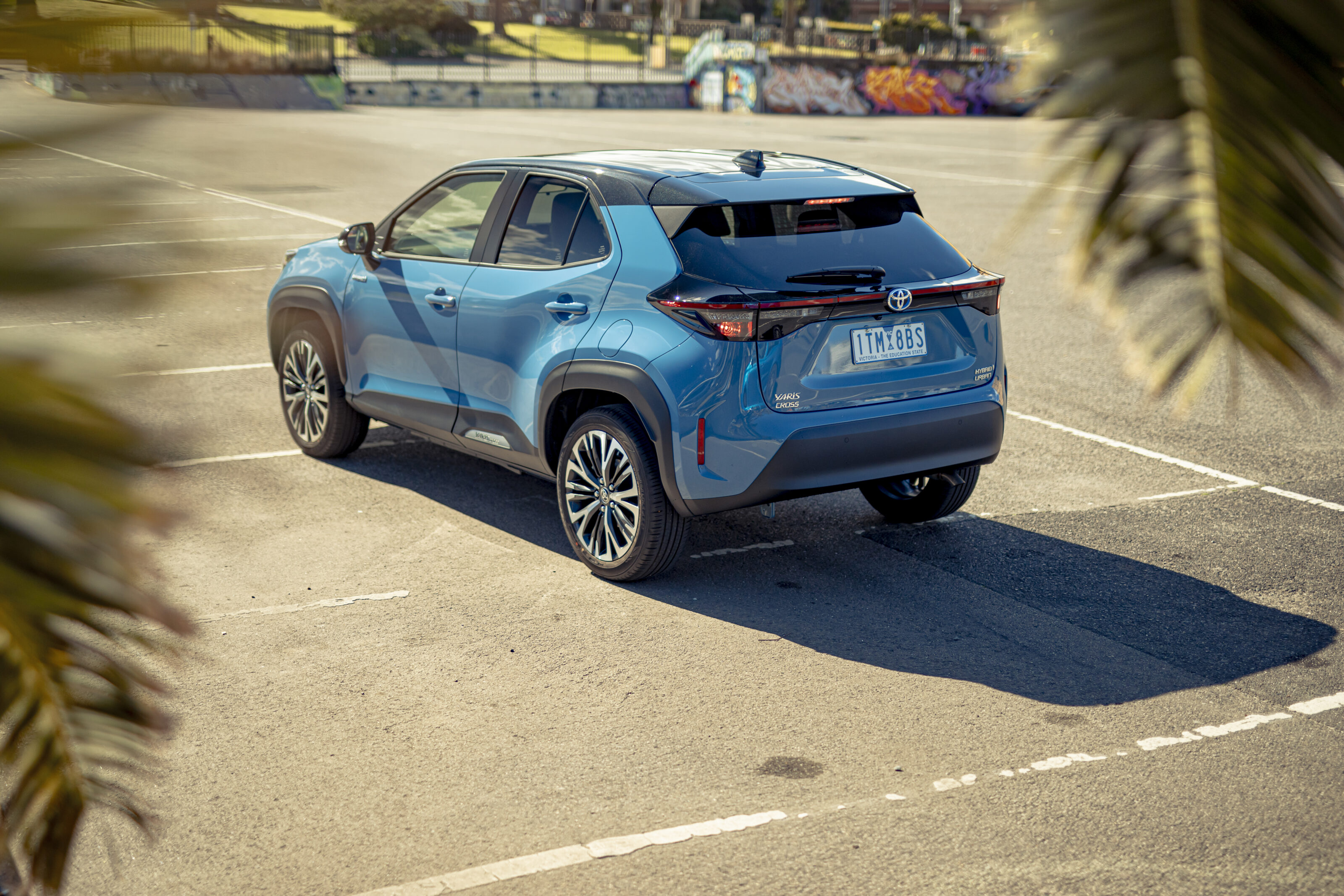
By comparison, top-of-their-range rivals – the Mazda CX-3 Akari LE Auto and Ford Puma ST-Line, will set you back $38,990 and $39,944 drive-away respectively minus any options. Again, though – neither is offered as a hybrid. The Urban’s drive-away price, without the options we had on this test, is $39,169.
Even though we couldn’t make the best use of the hybrid system in our Yaris Cross, its fuel economy was still a massive bonus and would suit those who are eco-conscious but don’t yet want to make the leap to fully electric.
Toyota pitches the Yaris Cross as meeting the “lifestyle needs of active urban dwellers” and we’d say that sums it up fairly well.
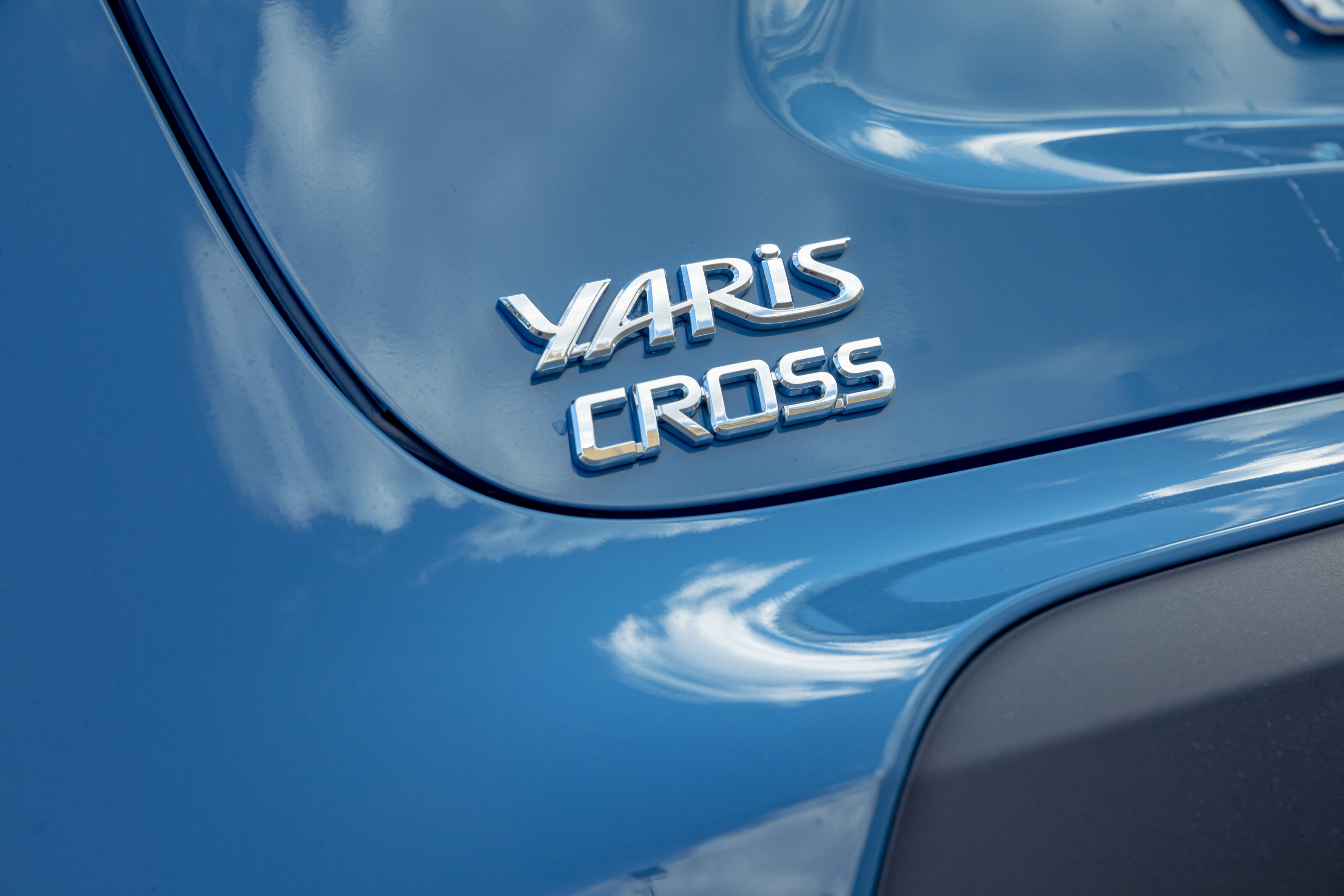
2021 Toyota Yaris Cross Hybrid 2WD specifications
| Body | Five-door light SUV |
| Drive | Front-wheel drive |
| Engine | 1.5-litre three-cylinder petrol hybrid |
| Transmission | CVT |
| Power | 67kW @ 6600rpm |
| Torque | 120Nm @ 3800rpm – 4800rpm |
| Bore x Stroke | 80.5mm x 97.6mm |
| Compression ratio | 14.0:1 |
| 0-100km/h | N/A |
| Fuel consumption | 3.8L/100km |
| Weight | 1235kg (kerb) |
| Suspension | MacPherson strut-type (front); Torsion Beam (rear) |
| L/W/h | 4180/1765/1590mm |
| Wheelbase | 2560mm |
| Brakes | Ventilated discs (front); solid discs (rear) |
| Tyres | 215/50 Dunlop Enasave |
| Wheels | 18-inch alloys |
| Price | $34,990 plus on-road costs and paint options |
Score breakdown
Things we like
- Impressive fuel economy
- High spec as standard
- Hybrid powertrain
Not so much
- Noisy engine and alerts
- Interior finish quality
- High price for top variant


